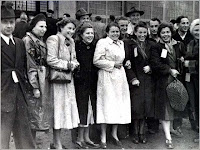A Slice of History
1971Australia's population is 12,755, 638 at the time of the 1971 Census. A total of 2,579, 318 born overseas (20 per cent of the population).
People from the United Kingdom (and Republic of Ireland) are the largest group (1,088,210), followed by Italians (289, 476) and Greeks (160 200).
The largest humanitarian group the Poland-born, who mainly arrived as Displaced Persons after the War totals 59, 700.
1973In January, the new Whitlam Government announces that future immigration policy would not distinguish between immigrants on the basis of race, colour or nationality. The White Australia Policy is finally abolished. The implications of this new policy for refugees are not tested until 1975, with refugee crises in East Timor and Vietnam.
In September, a military coup in Chile overthrows the socialist government of Salvadore Allende, and Australia takes in Chilean refugees. The Chilean program has bipartisan support and marks a break from previous refugee programs that tended to support refugees who were fleeing Communist governments. Between 1974 and 1981, about 6000 Chileans are taken in and, thereafter until the ending of military rule in 1990, hundreds continue to be admitted each year as part of either the Special Humanitarian Program (introduced in 1981) or family reunion program. The Chilean population in Australia increases from 3760 at the 1971 census to 24 042 in 1991
1974The Department of Immigration is disbanded and a Department of Labour and Immigration established by the Whitlam Government. Hon. Clyde Cameron MP succeeds Grassby as Minister in June.
Displaced persons from Cyprus are admitted after the Turkish occupation of northern Cyprus. The Cypriot population in Australia increases from 13 267 at the 1971 census to 21 629 in 1976
1975The defeat of United States-backed regimes in Vietnam is accompanied by massive displacement of Vietnamese people from their homes. Refugees flee to Malaysia, Indonesia, Thailand, Hong Kong and the Philippines.
Violent civil war in East Timor in August 1975 produces a wave of about 2500 evacuees to Darwin. About 700 agree to go to Portugal but the remaining group, which includes families without breadwinners, the elderly and unaccompanied children, are accommodated in Commonwealth Government hostels in Sydney and Melbourne. The December invasion of East Timor by Indonesian military forces leads to widespread resistance and guerilla warfare that lasts until independence is achieved in 2002. Throughout the 25-year struggle, a continuous flow of Timor-born people seek refuge in Australia. At the 1996 census there are an estimated 9200 Timorese born people in Australia.
The Migrant Service Section, together with the TIS (Telephone Interpreter Service) provides outreach services to these refugees at the Commonwealth Hostels.
Social Workers, Welfare Officers and Interpreters are sent to the Hostels on a sessional basis where these people are housed, to offer them information about what is available to them in terms of income support, housing and other services in the community .

Headed by
EVA BYRNE Former Board member, Good Neighbour Council of NSW; former Principal Social Worker, Settlement Services, Department of Immigration; and former honorary consultant to ECC of NSW and to FECCA. and ably supported by Nina Skoroszewski (nee Antonina Libiszowska), herself passenger no. 1060 on the wharf Bremerhaven, waiting to board the transport "Delmenhorst" for Australia. 31 August 1950.


(When she was working for the Department of Immigration she looked a little older.)
In December, following the general election, the Fraser Liberal Government establishes a new Department of Immigration and Ethnic Affairs, with Hon. Michael Mackellar MP as Minister.
1976In May, Minister Mackellar invites the Timorese who were admitted at the end of 1975 to apply for resident status. More than a thousand take up the offer.
Civil war in Lebanon results in the deaths of 50, 000 people and displacement of about 600,000 Lebanese and 150, 000 Palestinians from Lebanon. The Australian Embassy in Beirut is evacuated in March. Visas are granted to any relatives of Australian residents who have suffered extreme hardship as a result of the war, provided they meet health and character requirements. In the first half of 1976, more than 800 Lebanese are admitted. The flow continues with the worsening war and by 1981 the Lebanon-born community has increased
by more than 16, 000. Funding is provided to assist Lebanese community organisations to set up services for their communities. There are a number of new social workers and welfare
officers employed to provide appropriate culturally sensitive services to this new group of arrivals.
1978The Galbally Report the Review of Post-Arrival Programs and Services to Migrants is tabled in Parliament in May. The Fraser Government announces expenditure of $49.7 million on migrant services (English language teaching, initial settlement services, ethnic media, establishment of an Institute of Multicultural Affairs, and others) over three years to implement Galbally's recommendations.
Acting on the report, the Government establishes Migrant Resource Centres, reshapes the Adult Migrant Education Program, provides grants for migrant welfare workers, establishes the Institute for Multicultural Affairs and expands the Telephone Interpreter Service.
Comment:What was I think quite unique both for the time and for this country was the nature of the people who worked in this team. For the most part they were social workers, welfare officers and general clerical staff who were representative of the ethnic and language mix that either had or was arriving in this country.
There were people from various backgrounds:- Italian, Greek, Turkish, Cypriot, Maltese, Lebanese, Hungarian, Serbian, Croatian, Macedonian, Irish, Welsh, English, Australian, Scottish, Egyptian, Timorese, Ethiopian, Chilean, Chinese, Malaysian, and many other nationalities.
Where are they now when we have settlement issues with people who are from very very different ethnic an cultural backgrounds?
It's all very well to blame those who arrive for not settling into the Australian community however it would be just as well for the current Minister to consider that every time he points a finger at someone - there are three curled fingers pointing right back at himself.


